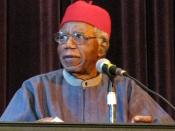In order to discuss whether or not any of the novels studied can be easily classed as 'post-colonial', we must first define what exactly post-colonialism is. Post-colonial literature has been described as, 'interaction between imperial culture, and the complex of indigenous cultural practices' . Simplified, this entails the study of the interaction between a powerful country and the country they colonised. The European nation held great sway over large parts of the globe, and this disintegration of this as countries fought for their freedom has lead to a growing interest in post-colonial studies, which are based around the historical fact of European colonialism. This is something that must be firmly remembered lest the precise meaning of the word 'post-colonial' be lost in a description of a dangerously wide variety of cultural and economic practices. Issues such as slavery, religious conflict, migration, suppression, resistance, and freedom all come under the heading of post-colonial studies; none are singularly definitive of post-colonialism, but together they form the basis of the theory.
Critics of the term, however, have questioned the use of the word 'post'; post generally implies 'after', but some countries remain financially dependent on others or have not erased all aspects of colonialism, even while still being called 'post'-colonial. The Congo, for example, is post-colonial; they are an independent nation, but the effects of colonialism are still very much felt, and they remain reliant on outside trade.
Joseph Conrad's well known novella, Heart of Darkness, is an example of post-colonial literature. It tells the tale of a man venturing into the jungles of the Congo in order to rescue an ivory trader named Kurtz from the dangers posed by African tribes, and indeed the greed of his own colleagues, mostly Belgians. Through the narrator Charlie Marlow, we see Conrad's view of the...


